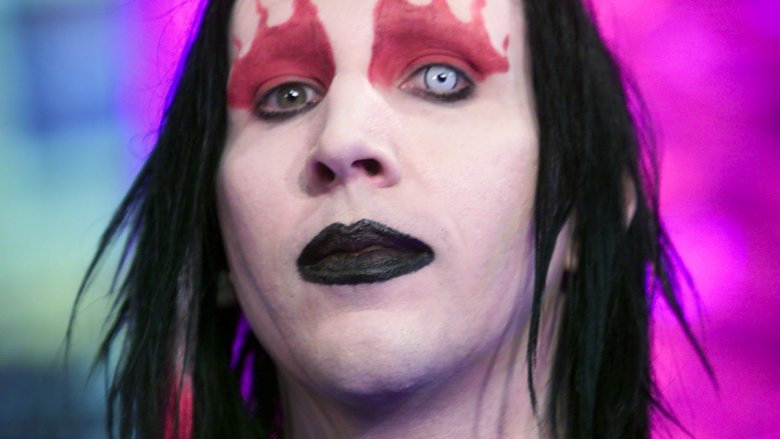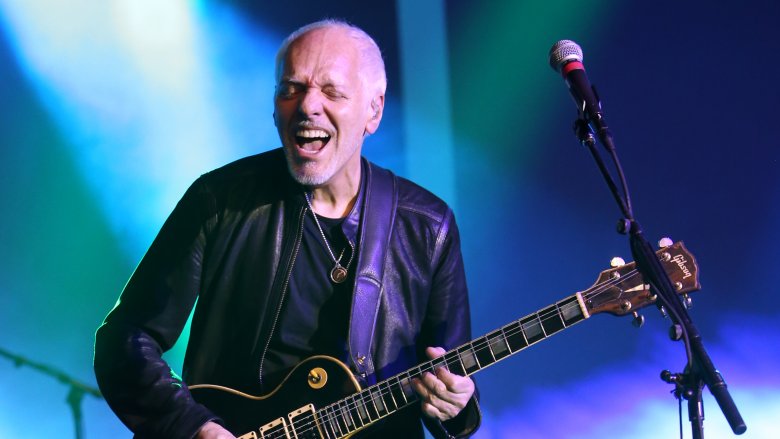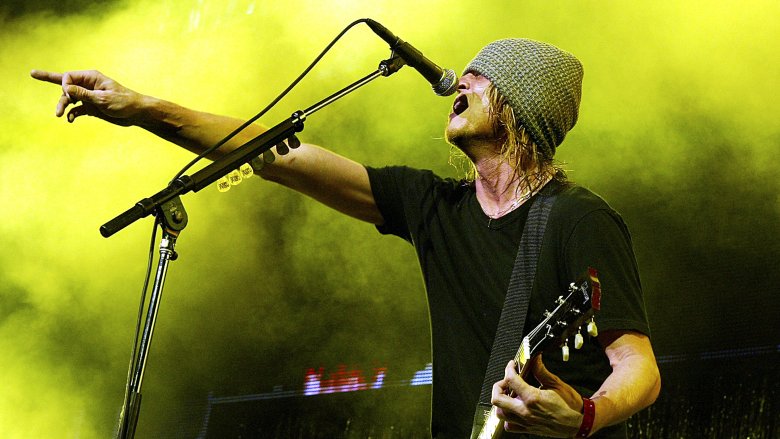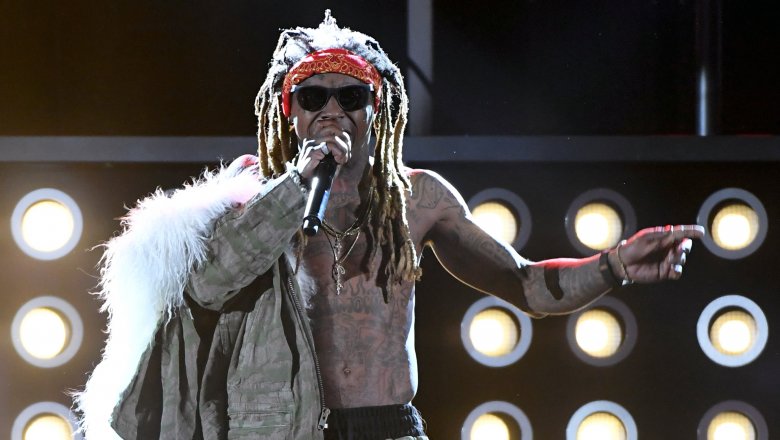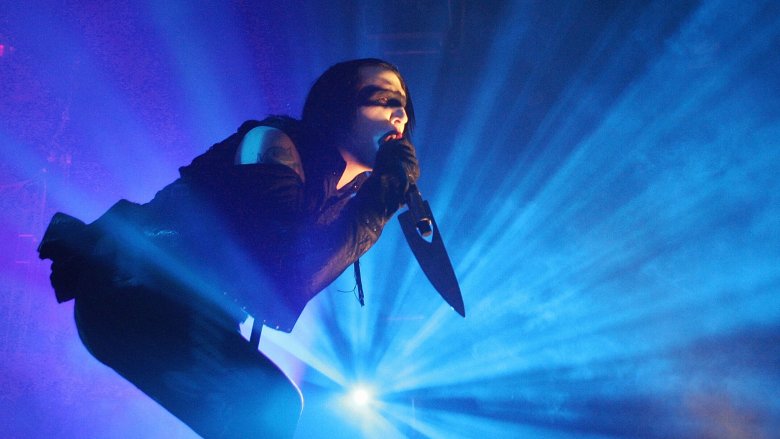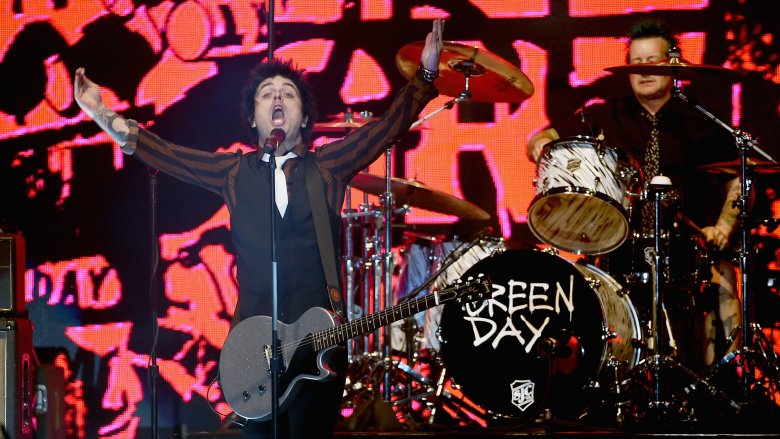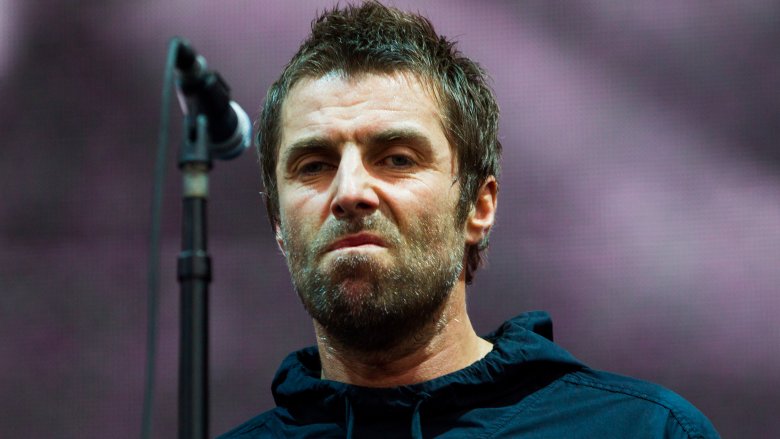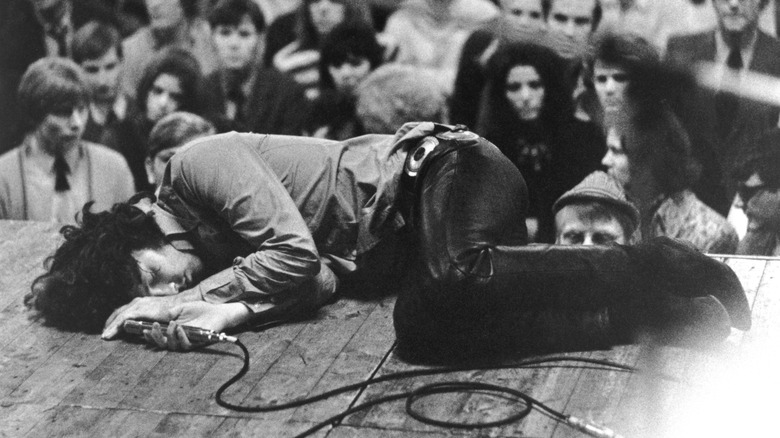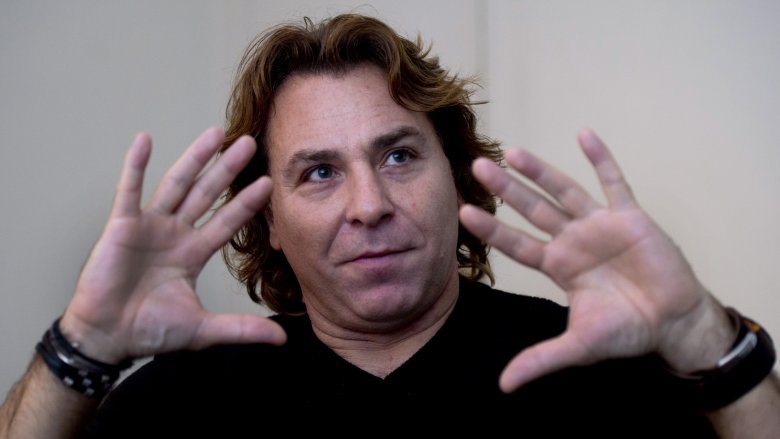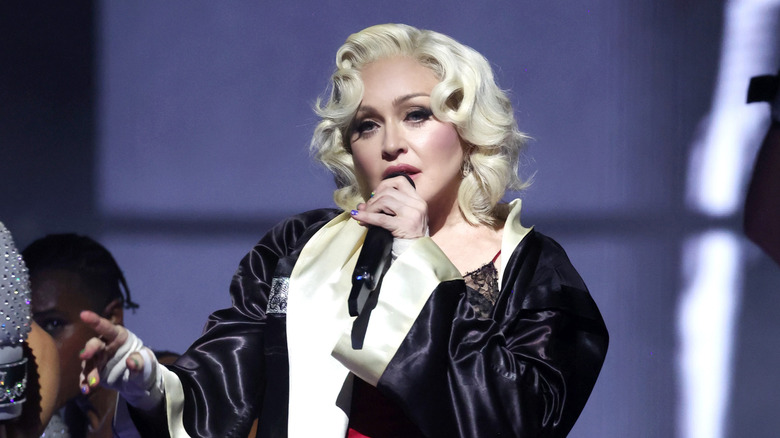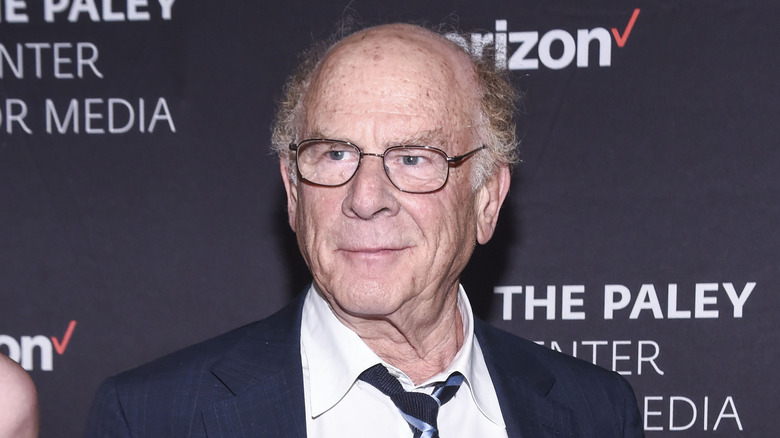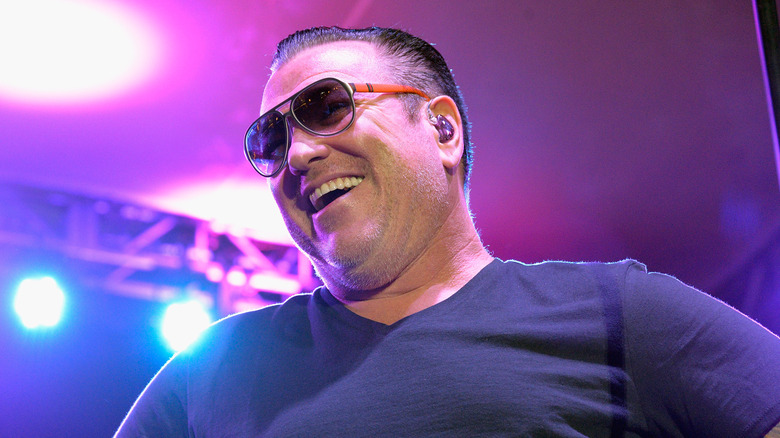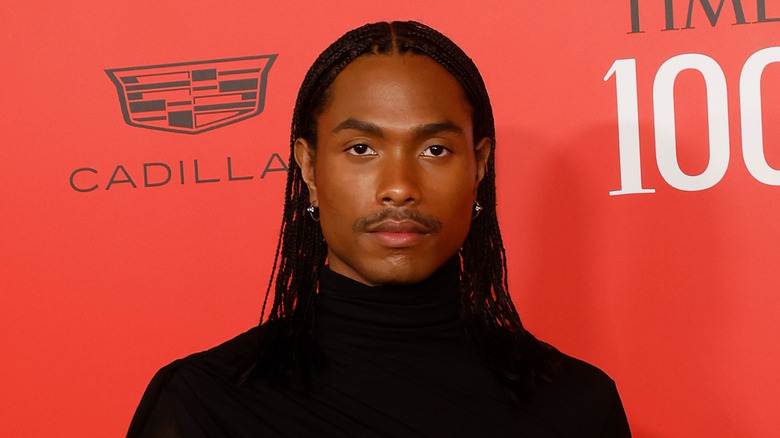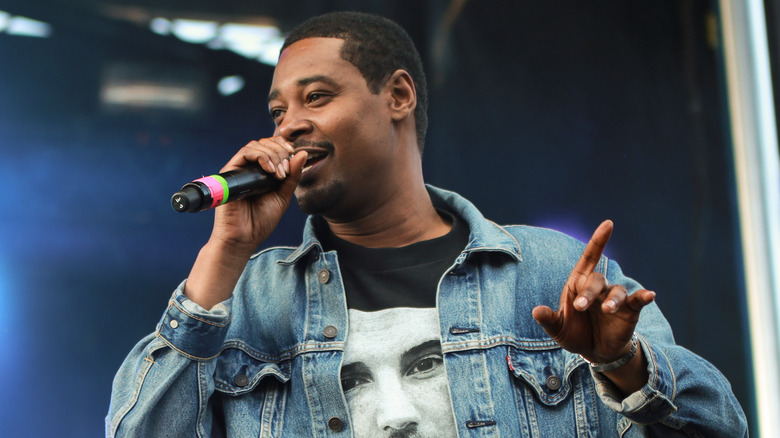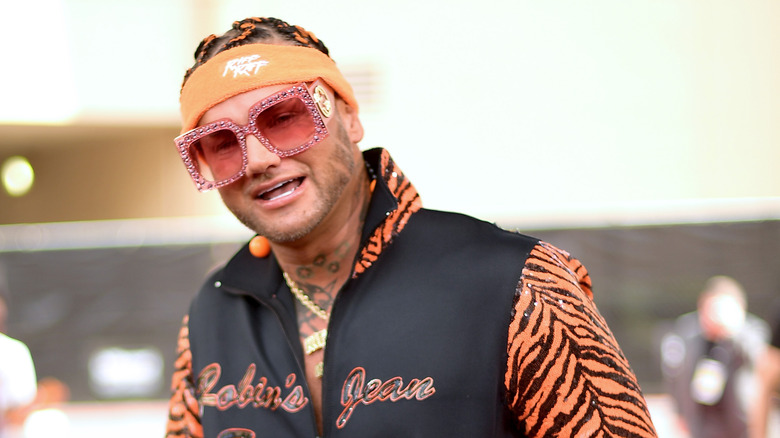Musicians Who Stormed Off Stage During Live Performances
"The show must go on" is a fantastic Queen song but a difficult motto to follow. Sometimes the show can't go on for technical reasons. Other times something upsets a performer so much that they say, "The show must go to hell" before storming offstage like a bat out of that very same hell. Whatever the explanation, some pretty high-profile musicians have spread their bat wings and flapped away right in the middle of live performances. Some of them didn't even wait until the middle.
While there are plenty of reasonable grounds for these musicians to vanish like indignant magicians, there are plenty of bogus ones, too. Regardless, audience members may feel tricked into spending their hard-earned money on tickets, traveling long distances, or waiting hours in line for half a song and a whole lot of disappointment. As if taking their cue from the flighty performer, those disgruntled concertgoers sometimes go batty and raise hell themselves. Here are some of the many cases where musicians took the stage and then took off.
Axl Rose (Guns N' Roses)
Hockey fans probably know Montreal as the city where overzealous revelers started fires after the Canadiens knocked the Boston Bruins out of the NHL playoffs in 2008. But in 1992, flaming mayhem ensued after a concert co-headlined by Metallica and Guns N' Roses, a band notorious for triggering riots. As the Montreal Gazette described, Metallica frontman James Hetfield was "seared to the bone" in a pyrotechnic mishap and went to the hospital. Metallica had to call it a night far earlier than planned, so Guns N' Roses could either start their set early or make the already bummed-out crowd wait. They made the crowd wait ... for over two hours.
Guns N' Roses' notoriously thorny vocalist Axl Rose didn't want to be there. He reportedly thought cities that started with "M" brought "bad juju." (If so, Hetfield's accident probably reinforced that fear.) Rose also had issues with the equipment but didn't ask for a roadie's help. While singing, Rose acted like an Ax-hole and "kept muttering into his mic." After nine songs — all of which probably sounded like "Welcome to the Mumble" — he abruptly exited the stage, no doubt wishing someone would take him down to the Paradise City. His bandmates were bewildered but rightly surmised that Rose wouldn't return. So they left, too. Outraged concertgoers tried to bring Montreal to its shun-n-n-n-n-n-n-n-n-n knees. According to Vice, an estimated 10,000 people rioted. Looting and bonfires abounded, and people overturned police cars.
Peter Frampton
English singer-songwriter Peter Frampton has probably given a lot of people ear-gasms over the years with romantic classics like "Baby, I Love Your Way," "Show Me the Way," and the suggestively titled "I'm in You." His much-beloved 1976 album, "Frampton Comes Alive!," rocketed up the charts to become "the biggest-selling album of all time" before the "Saturday Night Fever" soundtrack surpassed it, per Rolling Stone. People cherish "Frampton Comes Alive!" so much that a copy of the album briefly upstaged the actual live Frampton. He didn't take it well.
In 2017, Frampton made ear-love to an audience at Treasure Island Resort and Casino in Red Wing, Minnesota. However, a cameraman ruined his mood by filming a member of the crowd. As Star Tribune detailed, a woman held up a copy of "Frampton Comes Alive!," which showed up on the video screens. The roughly 8,000-person crowd unleashed roars of approval, interrupting Frampton's guitar solo. Then the camera focused on the woman's copy of "I'm in You." A visibly vexed Frampton "leaned his face into the camera and let out a two-word expletive." According to one eyewitness, the fuming musician got into a "camera tug-of-war" with the cameraman before leaving the stage. Then the video screens went black. A casino spokesperson confirmed that the singer did return to the stage after having the screens shut off completely, even throwing in an encore song to boot.
Wes Scantlin (Puddle of Mudd)
The lyrics to Puddle of Mudd's 2001 single "Control" read like a rough draft of "50 Shades of Gray: the Musical." There's a bunch of butt-smacking, being chained to a bed, and an unhealthy-sounding romantic dynamic premised on dominating one's mate. So it's a tad ironic that vocalist Wes Scantlin, who co-wrote the song, has a love affair with handcuffs that seems to be built on a lack of self-control. Scantlin's been arrested for a variety of erratic shenanigans, including attacking a neighbor's patio with a buzz saw, "taking a 'joyride' on an oversized luggage carousel" at Denver International Airport, and vandalizing a home he previously owned, per NME. Daily News reports that, in 2016, he had "a dramatic two-hour standoff" with more than 30 police officers during which Scantlin brandished a rifle.
That same year, Scantlin also had a one-sided showdown at a show in Ohio. Things were going surprisingly handcuff-free when the Puddle of Mudd frontman halted mid-gig to spew profanities at a random man in the crowd, whom he accused of the hard-to-commit crime of stealing Scantlin's house. Then the angry singer walked away. In 2017, he stormed off again while performing "She Hates Me" in Dallas. Scantlin glared at drummer Dave Moreno and said, "David, why?" before leaving in a huff.
Lil Wayne
Lil Wayne "stands just five-foot-six in sneakers," according to Interview Magazine, but he reached great heights by standing on the shoulders of his giant brain. A straight-A student, he established himself as a grade-A rapper at age 12. He nearly blew it all to hell when he accidentally shot himself in the chest but thankfully survived, thrived, and declared to the world, "I think you stand under me if you don't understand me." And if he can't stand you, he might stomp you lyrically, or at least stomp away from you mid-concert.
In 2015, the rapper verbally curb-stomped his former record label, Cash Money, and its owner, Birdman, who discovered and mentored Wayne. Rolling Stone reported that Wayne sued for $51 million — presumably in cash — because the company allegedly withheld money from him. He also roasted Birdman and co. in the song "CoCo (Freestyle)." Some of his verbal burns reached biblical proportions, most notably, "No more am I my brother's keeper — Cain and Abel" and "The day you met me is the day Hell froze / On the day I left is when it thawed out." Wayne wanted to perform "CoCo (Freestyle)" during a gig at Nova Southeastern University, but the DJ accidentally played the O.T. Genasis track "CoCo." The rapper responded with great vengeance and furious anger, cursing at the DJ and chucking his microphone before running off stage.
Marilyn Manson
Marilyn Manson's gimmick seems meticulously designed to create conflicting feelings in a public that likes to put people in neat categories. He needles mainstream society, subverting its idols with album titles like "Antichrist Superstar" and album covers like the one for "Mechanical Animals," which features Manson styled as what AllMusic describes as "a naked androgynous alien." He mocked the image-driven fickleness of fame in songs like "The Dope Show" while simultaneously gaining fame for a carefully constructed anti-aesthetic. But while his persona feeds off psychological discomfort, sometimes the person underneath has peaked through under duress, creating unplanned tension during shows, dope or otherwise.
In 1999, Manson abandoned a show after discovering someone had placed a smiley face on a stage prop. Per the Associated Press, the goth rocker angrily rushed offstage. Unruly concertgoers "swarmed Manson's tour bus," fought police officers, and committed trespassing, leading to 23 arrests. Fast-forward to 2018. Manson was on the mend after a different prop-related incident. As the Hollywood Reporter explained, a gun-shaped prop fell on him, fracturing his leg in two places. He was still wearing a cast when he returned to the stage months later. However, Manson unexpectedly left that stage after "only a few songs" because he felt the fans weren't "showing him enough love," according to People. He kept demanding applause and seemed incoherent. Many in the crowd felt cheated, while others understandably worried about his health.
Green Day
It takes confidence for a band to name their debut album for a major label "Dookie," and in 1994 Green Day was full of it — confidence, not excrement. Despite its name, "Dookie" doesn't stink. If fact, it propelled Green Day to superstardom thanks to stellar songs like "Basket Case," which touched on frontman Billie Joe Armstrong's bisexuality. The track's angst-filled lines portray Armstrong as "one of those melodramatic fools" who's full of neuroroses and amusingly asks, "Am I just paranoid or am I just stoned?"
Nearly 20 years after Green Day released "Dookie," the band was full of even more confidence, and Armstrong once again left us wondering whether he was paranoid or just stoned. The confusion surrounded an onstage eruption at the 2012 iHeartRadio festival in Las Vegas. Per The Guardian, Green Day started their set after Usher, whose performance ran long. Armstrong seemed to think the band's time was cut as a result, because when a digital signal indicated that Green Day only had a minute left to play, the singer flipped out. After basically calling the band's time allotment a load of, well, dookie, "Armstrong and his bandmates then smashed their guitars, storming offstage." Later the singer denied that the slot had been shortened and blamed his destructive outrage on drug and alcohol abuse.
Mariah Carey
Mariah Carey has compared herself to the prim and proper Mary Poppins, and it's not hard to see why. Though she doesn't travel via magical umbrella, her voice is like a spoonful of sugar. That dynamic voice made Carey a megastar among megastars. So when ABC wanted a musical heavy hitter for Dick Clark's New Year's Rockin' Eve with Ryan Seacrest in 2016, Carey seemed like a sure bet — probably the surest bet — to knock it out of the park. Unfortunately, technical difficulties rained on Carey's parade, and she didn't have a magical umbrella.
As CNN described, Mary Poppins Carey "belted out 'Auld Lang Syne.' Then her act started to unwind." When she tried to sing her Grammy Award-winning hit "Emotions," she couldn't hit the right notes and seemed to be at a loss for lyrics. Bad emotions followed as the exasperated singer explained that a proper sound check hadn't been conducted. Equipment problems reduced her to dancing in small bursts and seemingly trying not to explode. A third song brought another malfunction, so Carey walked off, and ABC kicked off 2017 by dropping the ball twice.
Liam Gallagher (Oasis)
Everything about the band Oasis sounded like the opposite of a place of refuge or relief — save for its name and maybe the song "Wonderwall," which, after all, is "about an imaginary friend who's gonna come and save you from yourself," according to guitarist/songwriter Noel Gallagher (per the BBC). If that friend existed, maybe they would have been the one to save Noel from his brother, lead singer Liam Gallagher, who infamously bashed Noel on the head with a tambourine mid-concert. The brothers often fought, and Liam clashed with everyone, including — and perhaps especially — the fans at concerts.
Liam has walked out on shows more times than one can count. One of those times led to violent revolt in Glasgow in 1997. Per The Herald, the band had just finished playing "Wonderwall" when someone lobbed a bottle, hitting bassist Paul ”Bonehead” Arthurs and prompting the band to storm off. Enraged fans rushed onto the stage and broke windows. In 2000, Liam angered Swiss fans at a festival in Nyon. The Guardian reported the singer hurled insults at the crowd, and the suddenly not-so-neutral Swiss hurled bottles and cans. So, Oasis took "a brief break," only to return, then leave for good after two more songs. In 2017, a post-Oasis Liam bailed on a concert again, blaming unspecified voice problems. However, many assumed he'd reacted to a pro-Noel Gallagher sign in the crowd. Hoping to save the performance, fans reportedly chanted, "F*** Noel."
Kanye West
Psychologists disagree on whether mental illness is a key ingredient of genius, but some studies and anecdotal evidence suggest a link. And while Kanye West might or might not be a genius in a traditional sense, his music proves his artistic IQ is through the roof. A man of many extremes, West lives with bipolar disorder and is a polarizing figure. He litters songs with strong contrasts and contradictions, whether he's ironically rapping about Black skinheads or "[cooking] up summer in the winter." He accused President George W. Bush of not caring about Black people but later somewhat backpedaled. He even told TMZ that slavery "sounds like a choice" (via the BBC). West gives show-stopping performances but also stops shows to go on off-the-wall tirades.
Across West's ebbs and flows, there have been two constants: Beyoncé and the MTV Video Music Awards. In 2009, he infamously interrupted Taylor Swift as she was accepting the MTV award for best female video. West then declared that Beyoncé deserved to win. And in 2016, West interrupted himself during a concert in Sacramento. He had gotten through two songs, according to The Sacramento Bee, before he began criticizing Hillary Clinton. He also accused Beyoncé of pulling strings to win the 2016 MTV award for video of the year — for which West was also nominated — and implored her husband Jay-Z not to have him assassinated. Afterward, he stormed offstage. The concert ended after 30 minutes.
Jim Morrison
Jim Morrison: tumultuous poet, musical Dionysus, and the guy who allegedly tricked Rick James into taking LSD. A hypnotic rock Adonis, the Doors vocalist owned every stage he set foot on. But he wasn't just a photogenic showman. For Morrison, performances were "experiment[s] in mass provocation, resulting in scenes of illumination and chaos," according to Warner Music Group's Rhino. According to author Stephen Davis' "Jim Morrison: LIfe, Death, Legend," the man who would be lizard king said in a bio, "I am interested in anything about revolt, disorder, chaos — especially activity that seems to have no meaning. It seems to me to be the road toward freedom..." (Morrison briefly lost his freedom in 1969 when police arrested him for exposing himself on stage.)
When Morrison sang "Break on Through (to the Other Side)," he wanted listeners to shatter boundaries and inhibitions. But he "broke through" in a different way on December 12, 1970, the night of his final live performance with the Doors, which he cut short. Technically, Morrison didn't storm off stage — he stormed through it. Doors keyboardist Ray Manzarek claimed that Morrison's "spirit" exited his body. The singer reportedly smashed a hole in the stage with his mic stand before walking offstage. Citing a Johnny Depp-narrated documentary, Nola.com wrote that people who recall that stage-busting outburst say it happened just before Morrison sat down and stayed down. That was the end, beautiful friend.
Manny Laureano
If you're familiar with Rufus Wainwright (pictured), you probably know he sang a lovely cover of "Hallelujah" for the "Shrek" soundtrack, and he wears his politics on his sleeve. Wainwright uses his music in fundraising efforts to oppose Republican politicians and makes politically charged songs like "Going to a Town," which contains the line "I'm so tired of you, America" and was described by Cavalier Daily as a "lacerating 2007 critique of the George W. Bush administration." Wainwright later used the song "as an implicit critique of Trump." So when he performed it with the Minnesota Orchestra in December 2017, the audience likely wasn't surprised that he slammed a GOP vote on tax legislation, remarking, "We have to fight for this country."
This unpleasantly surprised Manny Laureano, the orchestra's chief trumpeter. Laureano later wrote in a blog post that he knew practically nothing about Wainwright and thought he "sounded like a one-hit wonder with a following." Star Tribune reported that the upset trumpeter "conspicuously" stood, "swung his arm in an exasperated gesture, put his horn down and walked off." Laureano called this characterization an exaggeration but acknowledged leaving in protest. He considered Wainwright "angry" and "self-indulgent" and deemed his comments unacceptable "at a time of year" meant for togetherness. Hopefully he knows the audience came together to give "Going to Town" a standing ovation.
Roberto Alagna
Roberto Alagna is a French opera singer with Sicilian roots. As reported by Reuters, critics once considered the talented tenor "the successor" to Luciano Pavarotti. Unfortunately, opera directors found him criminally difficult, a fact which earned him and his wife — the vocally gifted but over-the-top-diva Angela Gheorghiu — a rather unflattering moniker: "the Bonnie and Clyde of opera." True to his nickname, during a 2007 production of "Aida," Alagna made the audience feel robbed.
As the BBC detailed, Alagna was the male lead in a Milan production of Verdi's classic tragedy. On the first night, the cast killed it, receiving a 15-minute ovation from an audience that included Italy's prime minister and German Chancellor Angela Merkel. On night two, Alagna died a quick, humiliating death. Reportedly sounding "nervous" during an aria, he got showered with boos and stormed offstage, abandoning his singing partner mid-song. Alagna's replacement had to rush onto the stage "wearing jeans" instead of a costume. Blind to the fact that he violated his contract with the famed La Scala opera house, Alagna threatened to sue after he was barred from singing in the remaining performances.
Madonna
Madonna is no stranger to blowing up, whether that be with a No. 1 hit single or with a profanity-laden rant. These days, it's more often for the latter than the former, though Madonna has had a long history of controversy. Plenty of folks will remember her disastrous interview with David Letterman in 1994, or that time she referred to her white son as a racial slur. These days, Madonna makes headlines fighting lawsuits from angry fans for starting her concerts hours late. It should come as no surprise, then, that the Queen of Pop has threatened to stop a show on more than one occasion, the most memorable being in Santiago, Chile, in 2012.
The pop goddess was approaching the end of her MDNA Tour, which had become one of the highest grossing of all time by the end of that year. However, Madonna couldn't help but get hung up before her show had even begun. According to I Love Chile, Madonna spotted a group of smokers in the audience during her sound check and stopped mid-song. "No smoking," she said. "If you're going to smoke cigarettes, I'm not doing a show." The singer had previously denounced smoking, including earlier that year when a photo of her daughter smoking surfaced online. When the group seemingly ignored her plea, she shouted an expletive and then stormed offstage. Things didn't improve; Madonna proceeded to begin the performance two hours late in a torrential downpour, only to end 40 minutes early and anger her fans. Classic Madge!
Art Garfunkel
Prior to his decision to stop touring as of 2023, Art Garfunkel had maintained modest success as a legacy act outside of his chart-topping partnership with Paul Simon. However, it came with some bumps in the road, most notably a vocal cord injury that almost caused him to lose his voice. In 2010, he was forced to indefinitely delay an entire summer reunion tour with Simon and several of his own solo shows. Three years later, Garfunkel had rehabilitated his voice to the point that he was ready to play small concerts again, which included an acoustic set at the Great Neck Arts Center in Long Island, New York, in 2013.
Dubbed "An Intimate Rehearsal," the show was an invite-only, two-night event that, according to a report from Page Six, came with a few unexpected moments. The first was when a woman, so overtaken by excitement at seeing Garfunkel live, literally fainted and was escorted out of the venue by stretcher. As if that wasn't enough excitement for Great Neck, Garfunkel left the stage not too long afterward when a patron in the front row struggled to turn off his cell phone after it began buzzing during the performance. The culprit was Jon Kaiman, a North Hempstead town official, who would apologize to Garfunkel shortly afterward. The musician returned to the stage to finish the set a few minutes later, when the audience resumed their sound of silence.
Steve Harwell (Smash Mouth)
The great poet Steve Harwell once sang, "Get the show on, get paid." Well, on one fateful afternoon in Fort Collins, Colorado, the man forgot to follow his own advice.
Every year, the Rocky Mountains city hosts the Taste of Fort Collins, a two-day food and music festival that features both local artists and international headliners. In 2015, the festival welcomed Smash Mouth to the proceedings. However, they also welcomed Bimbo Bakeries USA, who were giving out free slices of bread to attendees. This resulted in several pieces of bread, some the equivalent of a golf ball, according to Harwell (via The Herald-Mail), being flung at the stage during their set for both days of the festival.
By the end of day two, Harwell was over it. According to festival organizer Jason Ornstein (via The Coloradoan), the frontman left the stage toward the end of the set and was told an announcement would be made requesting people stop throwing bread. However, before they could say anything, Harwell barrelled back on stage and began threatening audience members in a three-minute, cuss-filled rant before the show's encore. Things got so intense that he began making his way offstage again, this time toward the crowd, ready to pick a fight. After Harwell was restrained by a security guard, the remaining bandmates started playing their final song — "All Star," naturally — and Harwell eventually calmed down and sang along with the crowd. The festival condemned Harwell for his behavior, and the singer eventually apologized.
Selena Gomez
In 2013, Selena Gomez fully divorced herself from the Mouse House. Her long-running Disney Channel series "Wizards of Waverly Place" properly concluded, and her first foray into arthouse film, Harmony Korine's raunchy "Spring Breakers," had hit theaters. More notably, she cut ties with her band, the Scene, to go solo; this gave the singer her fastest song to reach No. 1, "Come & Get It," as well as her first No. 1 album, "Stars Dance." She was quickly garnering her own reputation. However, a faux pas toward the end of the year would fully remove the Disney gloss, though probably not in the way she had hoped.
Gomez was a featured performer at that year's Jingle Ball, an annual holiday concert hosted by radio station KIIS-FM in Los Angeles. It's a major moment for any artist, so it's no surprise that Gomez was visibly upset when her microphone and earpiece were malfunctioning right from the get-go. Not only did it reveal that she was lip-syncing, but amidst her crew trying to fix the issue, Gomez was heard on-mic angrily saying "what the f***" during a blackout. She attempted using self-deprecating humor to appease the audience, many of whom were young fans, and promised to perform two more songs. However, she instead dropped her microphone and walked offstage.
Courtney Love
Much has been said about the passionate yet turbulent marriage between rock stars Courtney Love and Kurt Cobain, which took a tragic turn the day Cobain died by suicide in 1994. Love has done her best to cope ever since, but old wounds were re-opened after a fan held up a picture of Cobain during a concert in 2011.
As reported by NME, Love interrupted Hole's performance at Brazil's Starts With You Music & Arts Festival upon seeing the photo in the crowd. "I don't need to see a picture of Kurt," she said, along with a series of expletives. "I have to live with his s*** and his ghost and his kid every day. Throwing that up is stupid and rude." She proceeded to threaten the attendee and then call out Dave Grohl, previous drummer of Nirvana and current frontman of the Foo Fighters, before storming offstage. "Go see the f***ing Foo Fighters and do that s***." Love eventually returned on stage after her guitarist, Micko Larson, convinced the audience to chant a homophobic slur in reference to Grohl's band. Classy.
Love and Grohl's relationship had remained fraught following contentious litigation over their shared ownership of Nirvana's estate, something she addressed in an interview following the performance. "Dave makes five million dollars a show, he doesn't need the money ... My mother-in-law doesn't have a front door in the winter." Love has since attempted to reconcile with Grohl, but it clearly did not come without a few shots fired.
Justin Bieber
There are few modern musicians who fell from grace as publicly as Justin Bieber. The young heartthrob won preteens over with songs like "Baby" and "Boyfriend" but proceeded to lose them with a series of controversies, most notably successive DUI and assault charges in 2014. From there, Bieber became a bad boy prone to irate behavior while struggling to maintain composure and improve his public image. Things did not improve the following year; his musical rebrand into more introspective, EDM-influenced music was marred by a blow-up onstage in Oslo, Norway.
According to Norwegian news agency NTB (via The Local Norway), Bieber was performing a set for late night show "Senkveld" when, after his first song, he handed a bottle of water to an excitable fan in the front row. When she accidentally spilled some of it on the stage, Bieber quickly grabbed a hoodie to wipe it up. Though it's difficult to fully make out the video that was widely circulated online, it appears that fans were trying to grab Bieber's hoodie or even grab the pop star himself. "What are you doing? Stop it," he says, taken aback. When they continue, even after Bieber's insistence to stop, he speeds offstage. "I'm done. I'm not doing the show." Despite the crowd's attempts to send love with their own rendition of "Baby," Bieber never returned to the stage. He did, however, say "Sorry," though not in song form, but rather in an Instagram post the following day.
Billy Corgan
It's tough to strike out on your own as a solo artist, and it's even tougher to go solo when you've already agreed to get back together with your once-in-a-generation alt-rock band. Just ask Billy Corgan, Chicago native and frontman of the Smashing Pumpkins. After sex, drugs, and rock 'n' roll brought down his first Pumpkins offshoot, Zwan, the man was ready to go solo in 2005 with his electronica debut, "TheFutureEmbrace." However, Corgan took out full-page ads in both the Chicago Tribune and the Chicago Sun-Times on the album's release day to celebrate his new labor of love ... by announcing he intended to return to his original band. Talk about giving fans the farewell runaround.
It should come as no surprise, then, when, just one month later at a solo show in Melbourne, fans in the crowd heckled Corgan to play some Smashing Pumpkins songs. According to Australian outlet Undercover (via NME), fans were shouting things like "Play some Pumpkins" and "We want rock!" Corgan responded by pleading with fans to let him "live [his] life for today" and later suggested they get their money back if they were dissatisfied with his shoegaze stylings. The requests wouldn't stop, leading to Corgan dropping an F-bomb into the mic and leaving the stage. Though it was already toward the end of the set, fans requested he come back, to no avail. The fans eventually got what they wanted, though, as the Pumpkins would release their first reunion album two years later.
Steve Lacy
It's one thing to take a photo of an artist during a live concert. It's another thing when they offer to take your phone and snap a custom selfie. It's a unique but growing trend in live music that presents incredible risks but incredible rewards, which means entitled fans will reap it for all its worth. Artists like Drake and Bebe Rexha have since been hit with phones (the latter sustained permanent injuries), but one fan prior escalated the trend during a Steve Lacy concert in 2022.
Lacy was performing in New Orleans when, out of the blue, a disposable camera was flung to the stage, grazed his chest, and then went back into the audience. The entire incident was captured in a video posted to X, formerly known as Twitter, where Lacy is heard saying, "Yo, don't throw no s*** on my f***ing stage, please!" The singer stopped the concert mid-song, retrieved the camera, and proceeded to throw it to the ground, destroying it. He quickly exited the stage, had the culprit kicked out, and returned to complete the set. Despite online criticism that he had acted entitled, Lacy adamantly defended himself in a since-deleted Instagram post, saying, "I don't believe I owe anyone an apology" (via Fader). Months later, Lacy stood by his choices when speaking to Variety about the increasing trend. "I didn't apologize for that s*** because I'm not wrong!" Fans have injured more than a few artists onstage, and throwing things is one Bad Habit we all ought to get rid of.
Ben Gibbard (Death Cab for Cutie)
It was an unusual scene: Death Cab for Cutie was performing their hit song "Soul Meets Body" toward the end of a June 2016 show in Charleston when, all of a sudden, Ben Gibbard threw his mic down and stormed offstage. The moment, filmed by a concert attendee and posted to YouTube, felt very out of character for a songwriter as laidback as Gibbard. However, the real story wasn't what you saw on stage but rather what was happening offstage.
In an interview with Billboard, bassist Nick Harmer explains the many events that led to Gibbard's mini-meltdown. "All of Ben's equipment failed at the exact kind of unrelated moment there was a giant fight in front of us," he explained. "It's kind of scary, so we stop as a band thinking somebody's hurt or something's happening." In the video, you can see Gibbard pulling out his earpiece and dropping his guitar in frustration, indicating said equipment problems, after which drummer Jason McGerr stops mid-song to point out commotion in the crowd. All of this culminates in Gibbard's lashing out, which was followed by security stepping in to end the fight. The band eventually completed the set with an encore, but the entire moment was still a shock; Harmer cites anxiety following the deadly Pulse nightclub shooting in Orlando as part of what influenced their decision to stop the show. In the end, it turns out Gibbard's unprecedented reaction came from equally unprecedented circumstances.
Danny Brown
If you're being pelted with water, you're hopefully either running through a sprinkler, going down a slip 'n' slide, or riding Splash Mountain. It shouldn't be when you're, for example, performing as part of the Red Bull Music Academy Tour in Glasgow, Scotland. Unfortunately, that was the case for rapper Danny Brown, who was performing an a cappella run when a deluge of water hit him from the crowd. The whole 2015 incident was captured on video, though it's unclear whether he was hit with a water bottle or a cup of water. Either way, it was enough for Brown to immediately throw the mic to the ground and leave the stage, never to return — literally. According to Glasgow Times, Brown swore he would never play Glasgow again after the incident.
Many on social media were quick to hate on the culprit, a drunk white man in his early or mid-20s who was promptly escorted out of the venue. However, some were also quick to criticize Brown. "Danny Brown can rap about drugs and guns, but he can't take a pint of water?" asked one of the approximately 700 attendees. One user, in a since-deleted post on X back when it was known as Twitter, jokingly said, "lol Danny brown [sic] leaving the show cause he gets a drink thrown at him? mate that's a glasgow christening, you're a citizen now." If that is the case, Brown would hopefully receive a warm welcome should he ever decide to go back.
Azealia Banks
Despite their names sharing the same first letter, Azealia Banks and Australia do not get along. Their feud began in 2012 when Banks performed a measly 25-minute set at the Byron Bay-based Splendour in the Grass music festival, citing faulty equipment. She was quite apologetic at the time, promising she'd come back for another go and, sure enough, she did. At the 2013 Future Music Festival in Melbourne, she started Twitter beef with the Stone Roses by claiming they sabotaged her set. Then, later the same year, she headlined the Listen Out Festival, where she was hit by a drink 15 minutes into her Sydney performance. Needless to say, the music ended there.
The final straw came when another drink was thrown at her, this time a full can of beer, only 90 seconds into her set at Listen Out's Melbourne stint (via Billboard). The entire incident was captured on video, where you can still see Banks throw her mic and storm off after the item lands on stage. The rapper half-apologized the next day in a since-deleted post on X, formerly known as Twitter, but didn't exactly display remorse. "The can definitely didn't hit me," she wrote, "and I definitely still got paid. More press please, and thank you" (via HuffPost). According to The Guardian, Banks' wish was granted two years later when she (finally) completed a set at Splendour but later called Aussie audiences "terrible crowds" who are "violent and belligerent" in, yes, more deleted X posts. Banks is nothing if not consistent.
Fiona Apple
Fiona Apple once told Rolling Stone, "When I have something to say, I'll say it." That is a mantra that has never left the deeply traumatized yet brashly candid singer-songwriter, including at a Louis Vuitton party in Tokyo during 2013. The event was primarily held in celebration of the fashion staple's latest exhibition, titled "Timeless Muses," meaning that any music would probably amount to background noise. That didn't sit well with Apple, who quickly grew frustrated with the audience's chatter; it must not have helped that it was likely bouncing back and forth against the walls of the night's venue, the glamorous but high-ceilinged Tokyo Station Hotel.
According to Women's Wear Daily, Apple at one point stood atop her piano and asked the audience to quiet down; she then struck a metal bell in an attempt to quiet them further. Other fun stunts included hitting her head on her microphone, deep-staring into the eyes of her guitarist, and even back-bending over the piano bench. Surprisingly, none of this worked to shush the party attendees, so the borderline circus act continued when Apple began cursing at the crowd both on and off-mic. This culminated in her final words for the audience: "Predictable! Predictable fashion, what the f***?" She angrily exited the stage shortly after, shortening her already compressed party set. During a night themed around "Timeless Muses," Fiona Apple certainly provided a timeless performance for everyone in the room.
Jack White
Everyone loves deciphering a good mystery, but they usually don't come in the form of a rock concert ending abruptly. However, it took one reporter from The Observer being at the right place at the right time to spark a news story, that being previous White Stripes frontman Jack White's walk-off less than an hour into one of two concerts at Radio City Music Hall in 2012. Initially, there were numerous leads as to why White left the stage: a rowdy fan in the front row, ticket scalpers, what one security officer described as White's dissatisfaction with "the sound." White himself at one point implied it was about the energy of the audience, saying "Jesus Christ, is this an NPR convention?" Months later, he told Rolling Stone that he "was just doing what [the crowd] told [him] to do."
Whatever the reason was, it didn't stop fans from responding in kind. After aimlessly waiting for the show's encore — and even starting their own "Seven Nation Army" sing-along – the crowd became their own army and mobbed the stagedoor to confront White. Fans cursed and scolded White with statements like "Jack White kills puppies," all while banging on parked cars to get his attention. When a pizza man arrived, fans were even more upset, eventually taking to X, then known as Twitter, starting the hashtag #JackWhiteDebacle. However, by the time he played a killer full show the next day (as confirmed by Reddit users on r/jackwhite), most of the outrage had effectively died down.
Lupe Fiasco
The practice of throwing food in protest dates back to at least A.D. 63, yet someone in 2013 was more than happy to keep the tradition going at, of all places, a Lupe Fiasco concert. Indeed, the rapper lived up to his name while performing a show at Salt Lake City's The Depot, where a fan in the balcony hit Fiasco with a literal tomato. The initial moment was captured on video, and further reporting provided by local outlet The Salt Lake Tribune revealed the chaos that ensued.
Fiasco stopped the show after he was hit and began jeering the culprit. "If there [are] more people like that," he said, "I need them the f*** out of here ... I know what she looks like," he said, proceeding to insult them and use a sexist slur. Fiasco requested the entire balcony be cleared to weed out the perpetrator, and security obliged. However, rowdy fans in the section didn't want to evacuate. By the time security had gotten their way, Fiasco had grown impatient and left the stage. It wasn't until the crew began breaking down the equipment that fans took the hint. For a man who got big on claiming the show goes on, he let this show go off the rails. What's funnier is that, according to management, nothing at The Depot is served with tomatoes, so a larger question remains: Who was bringing tomatoes to a rap concert in 2013?
Riff Raff
Is anyone really surprised that Riff Raff is on this list? The rapper-turned-reality star, born Horst Simco, has had his fair share of controversial moments, from accusations of sexual assault to his arrest for drug possession. However, perhaps the most embarrassing was during Ohio University's Number Fest Halftime in 2013 when, after being hit in the chest by a beer can during a performance, Simco went on a verbal rampage before dropping the mic and exiting the stage.
The incident, captured on video and further reported by TMZ, saw the unruly rapper going off on the culprit during his performance at the Athens-based event. "I bet you won't step on the stage," he threatened, "I will whoop your f***ing a** ... throw a can on me? For real?" After shouting further expletives at the audience, he stopped the concert altogether. After exiting the stage, the music blared on; someone even threw something else at the stage, though it isn't clear what it was. Despite Simco's seemingly unfettered rage, he appeared to have gotten over it by the time he hit the local bars. TMZ acquired a group photo of Simco posing with a number of young Athens residents, some with beers in hand. Never before has Riff Raff better lived up to his name.
